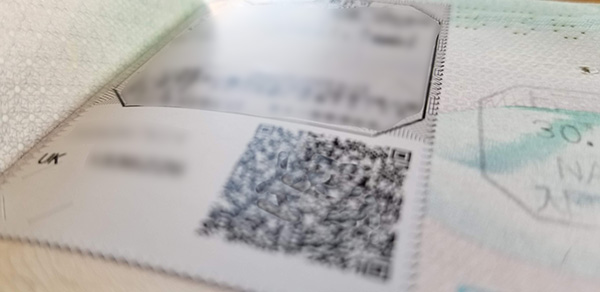If you want to freelance, work part-time or do your own thing in Japan, self-sponsoring your visa is a good step to removing a lot of red tape.
The thing is that there is little to no information online or even in government offices on visa self-sponsorship and what you need to do to get this very useful stamp of approval from the Japanese government. That’s because there isn’t actually a self-sponsor visa in Japan! Before you close this page down and give up, let me explain how you can get a de facto self-sponsored visa, which will allow you to do some really useful things.
Freelance in Japan
As long as your visa allows you to do that kind of work, you can file a form with immigration for each new job and do all kinds of different work. I even managed to do this for the private classes I wanted to start, and used the flyer I made as supporting evidence of the content of the work and they gave me a year to try it!
I made a whole article about freelancing in Japan here, but in short the biggest benefits are:
- Do work you’re really passionate about.
- Earn career capital so that your resume doesn’t read like you took an extended gap year.
- Work less and earn more per hour.
- No need to be a slave to your company.
Sounds great, so how do you actually do it?
Disclaimer: While I have spoken to a lawyer about self-sponsoring and have many friends who have successfully done it, you should always consult with your own legal counsel if you want to attempt this yourself. What worked for me and people I know may not work for you and since this is immigration we’re talking about, there could be some big consequences if you don’t do your own homework and talk to a lawyer about this. You’ve been warned.
What You Need To Self-Sponsor Your Visa In Japan

Government advice on this is thin on the ground, so there are a few resources I used when looking to do this for myself. As I said above, there is no self-sponsorship visa but you can use a part-time employer as a main employer during the renewals procedure, and then use other employment to make up the difference through liberal use of the Special Permission to Engage in Activities procedure at the immigration office. This means you have to do this when you already have a working visa for Japan. You can’t sort this until you are on the ground living and working in this country, but once you are here you can start looking for opportunities to piece different jobs together and make enough money to pay your way.
The forms for renewing your visa are at the government website here. This is what you’ll need to do to pass the sniff test:
- Get one of your part-time employers or a long-term client (as I did) to sponsor your renewal. The work must be within a category of working visa like the Specialist in Humanities/International Services/Engineer (these categories were combined in 2016), Artist, Journalist, Skilled Labour and so on. Sponsorship for renewal doesn’t cost anything for the employer, but they do have to fill out some detailed info about the company, its valuation, number of employees and get the official company hanko stamped on the form, so this is probably the most time consuming and annoying part of the procedure.
- You’ll need to show that you have a salary of over ¥3,000,000 annually (that’s ¥250k/month for those of you who aren’t so good at math) to show that you have a living wage and can make it with the income you have. I’ve heard of people getting it with as little as ¥200k per month, but I can’t comment as my freelance salaries were over the ¥3m mark. So, for example, if your main sponsoring part-time job is giving you ¥150k per month, you’ll need another ¥100k (or ¥50k) to make up the difference.
- File 個人事業主 (kojin jigyō nushi – Sole Proprietorship) with your local tax office and bring a copy of the stamped form with you as evidence. You’ll need more than this, so it is necessary but not sufficient to lower the raised eyebrow of your immigration office.
- And the bits of paper you’ll need are:
- The form from the government website link above.
- a certain size passport photo (4x3cm), your zairyuu card (gaijin card in the common vernacular) and passport, your tax return from the last 2 tax years (if applicable).
- Proof of the kind of work you are doing (aka a contract that lists hours/activities/remuneration) – you may need to include a list if you have a lot of different work, so just make sure it is clear and you have supporting documentation like contracts, payslips etc. You may need to get this translated into Japanese for certain types of jobs, and for my startup school I had this done by a translator on Fiverr.com for about ¥2,000.
- A certain document called a 在職証明書 (zaishoku shomeisho – Certificate of Employment) that you can get from your employer.
- Important one to get from the city ward office not the tax office called a 源泉徴収票 (gensen choshu hyo – Tax Withholding Slip).
- And one more useless piece of paper, a 退職証明書 (taishoku shomeisho – proof of retirement) from your previous companies. If you had multiple employers they will all need to give you one of these, and it is required by law for them to send it to you. Just make sure to ask for this well ahead of time in case they drag their feet.
That’s a lot of nonsense and paper hunting but in the end you’ll be the proud owner of a flashy new working visa that looks mostly the same as your old one.
The Nagoya International Centre is actually a really great resource for foreigners anywhere in Japan and they had this great article on self-sponsored visa and the renewals procedure.
How much money could you be earning in Japan?
Whether you're a teacher, freelancer, office worker or entrepreneur, you could be making much more money in Japan. Find out how much:
A Curveball To Look Out For

The immigrations officer you get might be an idiot. Immigrations officers are government bureaucrats, and the overwhelming majority of them can’t speak English, so explaining anything is going to be a pain even if your Japanese is as good as mine (I can talk all day in Japanese, but immigrations procedures would be complicated even for Japanese people). That’s why I highly advise doing two things:
- Be 100% prepared and make their job easy-peasy. Any extra work they have to do will make them more annoyed at you (even though it is absolutely the government’s fault for infamously not including all the information on their website). Look up for all the things you need to prepare.
- Be willing, ready and able to come back another time if necessary (mostly to get a different person at the desk). I went back to immigration again after the first time because the officer I was paired with just said (in Japanese of course) “No! Get just one company and come back.” I came back the next day with mostly the same paperwork, got a different (younger) guy, and he put through everything without complaint. I got my renewed visa about 3 weeks later.
You need a lot of patience if you’re going to do it this way. I was exhausted by this procedure and I really needed to get it done ASAP as I was looking for places to move when I got mine done, and needed the visa to show the landlord that I wasn’t just about to get deported. Thankfully I got my visa in time to move into my great apartment 10 minutes away from Shibuya. I talked about how I got this place in a podcast here.
Self-sponsoring Your Visa In Japan Isn’t A Guarantee Of Success
After getting back to back 3-year terms on my first two visas, my renewal as a self-sponsor only gave me a 1-year term. I don’t know why, but they might just be checking to make sure I can make enough money and follow all the rules for a year before they give me a bit more freedom. Be ready to spend more time than you (or any sane person) would like to at the immigration office.
Convincing an Employer/Client to Sponsor You
Like I said at the beginning, self-sponsoring your visa doesn’t just mean doing whatever you want to do, like a free-for-all for visa permissions. Otherwise everyone would just do it. You still need to get immigration to sign off on the work, and when it comes to renewal time that means having one of your employers or clients (like in my case) to give you some information about their company and get their official company hanko (stamp) as evidence that you work there and that they would rather you can stay in the country to continue to do so.
Many people who work at multiple schools and freelance to get higher paid teaching gigs will get their main school (the one they have the most hours at) to help them renew their visa. Schools are often the best ones to do this as they will not only have a procedure in place if they are hiring foreign teachers, but also do not want to lose any teachers part way through the year as this reflects badly on them. Ideally, if you teach as well, get the school to support your visa renewal, then your other jobs will be “Special Permission to Engage in Activities” applications along with that.
If it is a client you need to explain to them a few things that will help get them on your side enough to help.
- It won’t cost them anything other than time and information.
- they don’t need to take responsibility for you.
- it’s a formality.
A lot of employers will be hesitant to help with this as they don’t want to get involved in immigration issues, so clients are even further removed. They don’t want to be responsible for you, so it’s up to you to know how this works so your client can just say “Oh yeah, I’ll help you out.”
Renewing a visa is a few pages of form filling with details like company capital and number of foreign employees and such, so if you’re going to get a client to do it just make it the easiest “yes” you can possibly make it. You can even offer to fill all the details for them that you can, and just leave a few of the more sensitive sections and the stamping to them.


